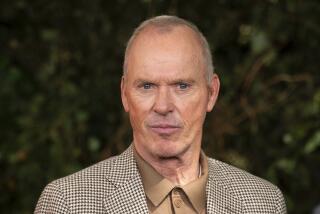In a Role That’s Tailor-Made
“That face!” Diane Keaton exclaims. “It’s a great face. It’s beautiful!”
What is it about Walter Matthau’s face?
It’s curmudgeonly. It’s gruff. He seems to have been born looking old.
Who in movies had a face like Matthau when he started out in the ‘50s? Who looked like that and still got the girl?
It was an unlovely face. Still is. It’s what the term “hang dog” means. But who can look at him now, sad-eyed and grumpy, and say that his face isn’t adorable? Heartbreakingly so.
Born looking old, Matthau has grown into his kisser.
“His time on earth, living, is reflected in his face,” Keaton says, still trying to put it into words.
And that life, whether anyone planned it this way, is reflected--or at least evoked--in his new movie, “Hanging Up,” which opened Friday.
The ad campaign makes the film look like a comedy about three sisters (played by Keaton, Meg Ryan and Lisa Kudrow). This is partly true. But mostly it is about the way one sister (Ryan) deals with the declining health of her aged father.
Based on a novel by Delia Ephron, the script was written by Ephron with her sister Nora, and it’s drawn from their family experience. But as personal to the Ephrons as this story is--and despite some early resistance to casting the 79-year-old Matthau--the role seems made for him.
Matthau plays Lou Mozell, a sometimes lovable, sometimes impossible sex-crazed old man. He is attached to his daughters in umbilical-cord-like fashion by the telephone.
Mozell has retired from a Hollywood job, and photographs of a younger Matthau are used in the film, which Keaton directed. A decades-old familiarity with the actor informs the audience’s reaction to the character.
When it’s pointed out the degree to which actor and role seem to merge, Matthau demurs: “I think that’s what all actors do, consciously or unconsciously,” he says in a recent phone interview.
But adding to the effect here is that the actor drew upon his own life in the improvisations Keaton coaxed from him. Not all of the lines made it into the film, but Keaton says she felt as if she were seeing a personal side.
“He has an ability to be very romantic, which is a very surprising aspect of his personality,” says Keaton, who did not know Matthau before they began work on the film. “He’s been married like 30 years to his wife Carol, and he really deeply loves her. He would go on and on about his wife and it was beautiful.
“Another time he talked about his love of Mozart. I was just shocked at how rhapsodic he was.”
That Matthau is playing a character in the last stages of his life adds an elegiac quality.
The actor says he wants to get back to work on another movie--”I’m the only person talking about it,” he says, but he’d like to do a second “Grumpy Old Men” sequel with Jack Lemmon.
But when one hears that he was hospitalized with a case of pneumonia in the middle of making “Hanging Up” and that he had to leave the production early, the close identification of the actor with the role becomes uncomfortable.
“He’s fine now,” Keaton says. “He’s ready to work.” But at the time it gave everyone a scare, she says.
“They had nothing to worry about,” Matthau says in his familiar growl. He was back doing voice-overs shortly after he took ill, he says. “It was just a couple of days, as far as I remember.”
Most of his scenes already were in the can, but Keaton had to cover a few holes caused by his absence.
The actor’s son Charlie, a movie director, stepped in to portray him in some flashback scenes. “He’s pretty good, too,” the actor quips, “but he’s better looking.”
Keaton ‘Terrified’ in Director’s Role
Keaton came to direct “Hanging Up” almost by accident. She had wanted to act in the movie. She read for a part but was passed over.
“Of course, when I was younger I never did readings,” says Keaton, 54. Jokingly, she imitates the star’s typical arrogance: “I don’t do readings.”
“Now, I do anything for a part,” she says with a laugh.
Nora Ephron, who previously had directed “You’ve Got Mail,” “Michael” and “Sleepless in Seattle,” among other films, considered directing “Hanging Up.” When she opted out, the job was offered to Keaton.
The actress had directed for the movies and TV, but directing a film that was so closely tied to the personal experiences of the screenwriters--who also were producers of the movie--”terrified” her, she says. Her other two feature-length movies (1995’s “Unstrung Heroes” and a TV film, “Wildflowers,” from 1991) also were adapted from books, and she says the authors weren’t pleased with the results.
“I told both Nora and Delia upfront: If I’m going to do this, you have to realize that I’m not you,” she says. The sisters said they welcomed her outsider’s perspective.
“Then they came back a couple of months after that and said, ‘Would you act in it?’ ” Keaton recalls. At first she thought acting and directing would be too much, but she soon changed her mind.
“I was worried about the actors ganging up on me,” she says, sounding a bit like the neurotic character she played in “Annie Hall.” “I don’t know why. There was no proof that they would.” But if she joined the cast, she thought “it would be all of us in there together. A shared experience.”
Matthau was a breeze to work with, she says. His instincts were on the money. Sometimes she’d ask him to improvise and he’d tell her he liked the words the way they were written. She’d realize later that he was right.
“I’m very protective of scriptwriters,” Matthau says. “Writers don’t have any protection in a movie.” And having worked for so long on the stage--he’s done 18 plays on Broadway--he has an appreciation for the words on the page.
“If I don’t like a script and I’m doing the picture because I have to work because I need money, then I might try and improvise without making it seem like I’m doing that,” he says. But he liked the script for “Hanging Up.”
“The girls are good writers,” he says of the Ephrons. “They have a talent for writing which is very rare today . . .
“There are no more stories in the movies, no more human stories about interesting characters. They’re all coming from outer space or they’re monsters from within which explode out of you into cellular Internet telephones or something. All kinds of goofy ideas.”
Early in his career, Matthau compared movie work to being in the Army: “You set your mind to it and do it.” He also talked in those days of wanting to maintain his anonymity so that he could mingle with people, unnoticed, and observe.
He lost that ability decades ago. And, while he’s done little acting on stage in the last 30 years, he says he always preferred the theater, where actors get to rehearse and delve into their characters for sometimes eight weeks before starting a play and where he enjoyed the response of a live audience.
In those days he played all kinds of roles, without the typecasting and other limitations that stardom brings.
“I started out anonymously,” he says. “So I could play anything. When I was 27 I played an 85-year-old English bishop on Broadway. That was in ‘Anne of a Thousand Days.’ In 1948.
“I don’t think it’s good for actors when someone says, ‘Oh, there goes so-and-so. He does those grumpy parts.’ When you try to do parts that are not grumpy, a part that’s Mozart, say, instead of the Beatles, then they’re not happy. Neither are the producers and studio heads. They want recognizable characters that people will go see more than once. It’s limiting.”
More to Read
Only good movies
Get the Indie Focus newsletter, Mark Olsen's weekly guide to the world of cinema.
You may occasionally receive promotional content from the Los Angeles Times.










